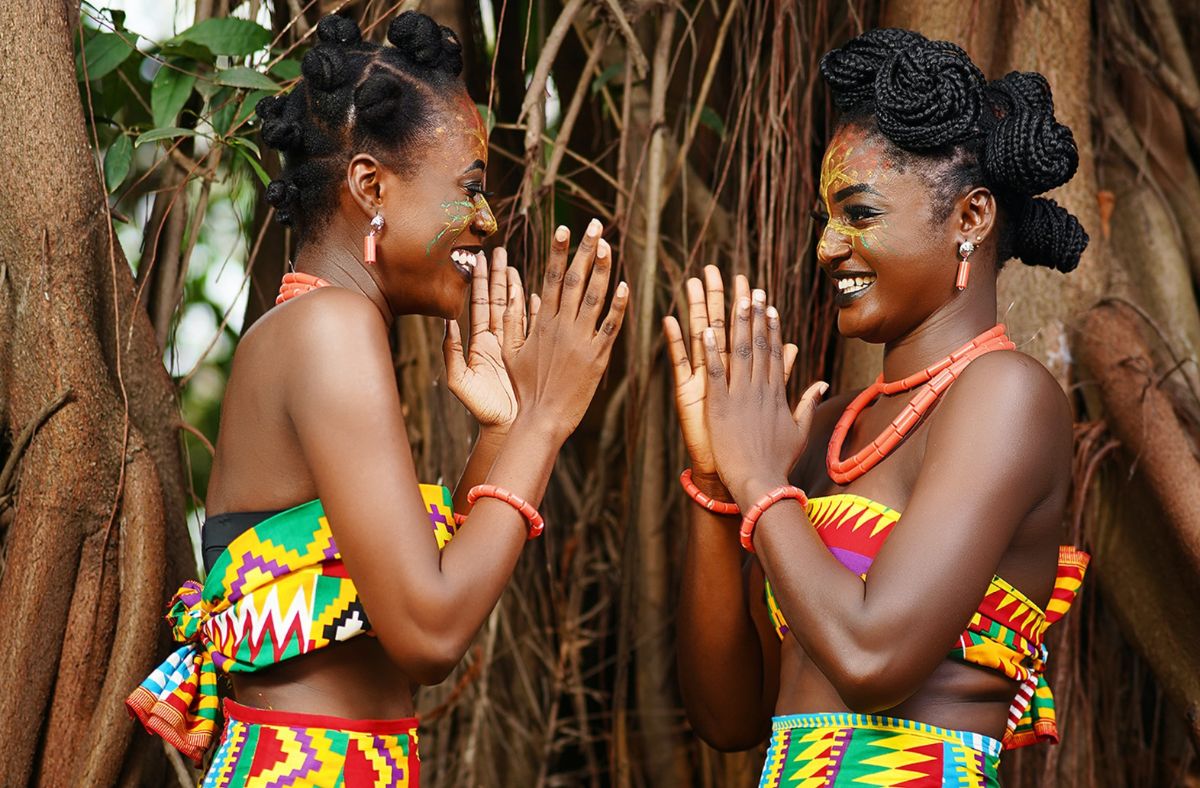A picture containing Two African Women from Ghana Playing Together in the outdoor next to tree wearing African clothing. Photo by Built By King from Pexels: https://www.pexels.com/photo/two-women-playing-together-11403821/
The Ga language is a Niger-Congo dialect in Ghana, a West African country with a rich ethnic heritage. It comes from the Ga people, a tribe indigenous to the Greater Accra Region of southern Ghana. Moreover, people in parts of Benin, Togo, and Western Nigeria also speak Ga. In fact, studies estimate there are 700,000 native Ga speakers in total. Also, thanks to its government-sponsored status in Ghana, this number is sure to grow!
So, understanding this language can be beneficial, especially if you want to communicate with locals in the area. Here, we take a closer look at Ga’s basic features and discuss ways you can become more fluent. Let’s get started!
Understanding the Basics of Ga
Ga has 31 consonants, 7 oral vowels, 5 nasal vowels, and 2 tones. All the vowels have three lengths: short, long, or extra-long. When writing these vowels, you double or triple the letters to represent the lengths. For example, ‘a‘ (short), ‘aa’ (long), and ‘aaa’ (extra-long).
Additionally, the Ga alphabet is Latin-based, with 26 letters (with 3 extra letter symbols), 11 digraphs, and 2 trigraphs. The table below lists the Ga alphabet and similar English sounds:
| Ga Letter | Similar English Sound |
| a | a as in far |
| b | b as in ball |
| d | d as in do |
| e | a in late, but shorter |
| ɛ | e as in get |
| f | f as in fill |
| g | g as in go |
| h | h as in help |
| i | ee as in seek, but shorter |
| j | j as in jump |
| k | k as in keep |
| l | l as in lip |
| m | m as in mean |
| n | n as in neat |
| ŋ | ng as in long |
| o | o as in note, but shorter |
| ɔ | o as in lot |
| p | p as in pit |
| r | dd as in madder |
| s | s as in seat |
| t | t as in tea |
| u | oo as in too, but shorter |
| v | v as in veal |
| w | w as in well |
| y | y as in yes |
| z | z as in zero |
Common Ga phrases include:
- Miiŋa bo! – general greeting
- Ojekoo – good morning
- Minaokoo – good afternoon
- Oshwiee – good evening
- Te oyɔɔ tɛŋŋ? – how are you?
- Te atsɛɔ bo tɛŋŋ? – what is your name?
- Miikase Ga – I am learning Ga.
- Oyiwala dɔŋŋ – thank you
- Yaaba jogbaŋŋ – goodbye
Exploring the Ga Language Family
What is interesting about the Ga language is how it ties to the culture of the Ga people. This community is almost two million strong and was previously nomadic. Historians believe they traveled from Lake Chad down the Niger River, reaching the present-day Accra Region.
Some common family names in this ethnic family include Adei, Amon, Aryee, Kotey, Kotie, Kutorkor, Lamptey, Lartey, Nikoi, Nortey, Oblitey, and Poku.
Furthermore, Ga is a Kwa language, which is a language family that includes Ga, Dangme, and Na-Togo. In 1895, linguists introduced the name Kwa to represent these languages. It comes from the word kwa, which means people in many of its branching dialects.
Strategies for Learning Ga
Like many of the languages of the Sahara, Ga is tonal, and variations from high and low change the meaning of the word. Moreover, you must be aware of the many vocal alterations to ensure your speech is correct.
Thus, it is worth mixing Ga into your everyday life to improve your language skills. Make it part of your daily routine to sit down and study a few words and phrases for at least 10 – 20 minutes a day. Moreover, as you learn, make it a habit also to write down what you learn. Writing helps you memorize new words and phrases and is one of the best ways to learn a new language.
You can even have some fun with this! Try writing new phrases on post-Its and stick them around your house. Then as you go about your day, you will notice and read the words which will help you learn. This method is a type of passive learning and can make learning a new language more enjoyable.
Additionally, watch Ghanaian TV programs and online videos. This media tests your Ga knowledge and improves your listening and speaking skills. As the Ga language has nearly a million native speakers, you will find plenty of content to listen to. Cooking shows and news programs are especially helpful.
Music is also a great way to improve your Ga language fluency. There are many Ghanaian artists who sing and rap in their native languages, and Ga is one of the most popular. Of course, you need to be more careful with music as it often uses more slang and mixed phrasing. However, as your learning progresses, this music can help you gain an ear for the local vocabulary. Also, you will learn how to modify words properly.
Last but not least, find native speakers you can practice within your area or online. Not only will they help correct your mistakes, but they can also help improve your pronunciation and teach you new phrases. Undoubtedly, the more you use the language, the more you will learn and become fluent.
Resources for Learning Ga
The online Ga community is growing faster than ever, spreading its knowledge! Nowadays, there are many resources available to help you learn Ga, including:
Wrapping Up
The Ga language is a very interesting Ghanaian dialect. It can open a world of opportunity whether you want to travel, explore, work, or expand your business in Ghana.
If you want to learn Ga, Cee Koko’s interactive books and instructional videos are the perfect choice. Not only do they provide an excellent educational foundation, but they are also easy to understand and make learning fun. So visit our official online shop today to explore our collection and begin your language-learning journey!


